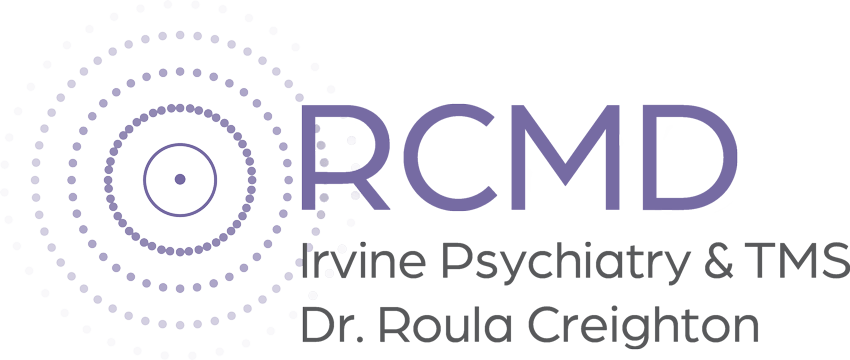Anorexia
IRVINE PSYCHIATRY AND TMS - DR. ROULA CREIGHTON
What is Anorexia?
Anorexia nervosa, often simply called anorexia, is an eating disorder characterized by a fear of gaining weight, a distorted body image, and a refusal to maintain a healthy body weight. Individuals with anorexia nervosa typically severely restrict their food intake, excessively exercise, or use laxatives or diuretics to control their weight. People with anorexia have an intense fear of gaining weight, often see themselves as overweight even if they are dangerously underweight, and have a distorted body image. They may have a rigid, self-imposed restriction on the amount and types of food they will eat and might engage in other compulsive behaviors to maintain their weight such as excessive exercise, fasting, and misuse of laxatives or diuretics. Anorexia can cause serious physical and psychological problems, and it can be fatal if left untreated.
What Causes Anorexia?
The exact causes of anorexia nervosa are not fully understood, but several factors likely play a role. Here are 3 key things that may contribute to the development of anorexia:
- Psychological factors: Anorexia nervosa is often associated with a range of psychological issues such as low self-esteem, perfectionism, and difficulty expressing emotions. Some research suggests that people with anorexia may use restrictive eating and weight control as a way to cope with emotional distress or gain a sense of control over their lives.
- Biological factors: Some research suggests that certain genetic and biologic factors may make some people more susceptible to developing anorexia. Studies on twins and families suggest that there may be a genetic predisposition to the disorder.
- Social and cultural factors: There may be cultural, societal, or familial pressure to be thin, which may contribute to the development of anorexia. The media's portrayal of thinness as the ideal body type can also play a role. In some cases, there may be a trigger event, such as the loss of a loved one, divorce, or a traumatic experience that initiates the disorder.
It is important to note that eating disorders are complex and multifactorial conditions, and there is likely no one cause. A combination of several factors, including psychological, biological, and environmental, are likely to play a role in its development.
Psychological
Biological
Social
How do You Get Over an Eating Disorder?
Overcoming an eating disorder is a complex and difficult process that requires a tailored approach that addresses the specific needs of the individual. It often requires a combination of therapy, medication, and nutritional counseling.
Therapy: Talk therapy can help the individual change their thoughts, feelings and behaviors related to food and body image. This can include cognitive-behavioral therapy, dialectical behavior therapy, acceptance and commitment therapy, and family-based therapy.
Medication: In some cases, medication may be used to help address symptoms such as depression, anxiety, and obsessive-compulsive behavior.
Nutritional counseling: A registered dietitian or nutritionist can help the individual to develop a healthy and sustainable eating plan that addresses any nutrient deficiencies.
Building a support system: Having a strong support system of loved ones, healthcare professionals, and peer support groups can help with the recovery journey. Additionally, participating in self-help groups, workshops and other aftercare can help keep the individual on track in their recovery process.
Overcoming Anorexia Disorder
At Irvine Psychiatry and TMS, we understand the challenges that come with overcoming anorexia and we are dedicated to providing evidence-based treatment options that are tailored to the individual's needs. Our team of experienced therapists, dietitians, and other healthcare professionals work together to develop a comprehensive treatment plan that addresses the individual's specific needs and goals. We understand that recovery is a journey, and we provide ongoing support and resources to help our clients maintain their progress and achieve long-term success. If you or someone you know is struggling with anorexia, know that help is available, and we are here to support you every step of the way. Don't hesitate to reach out for help, healing is possible.
Explore Services
Send us a Message
Website Form
Need help?
Contact Us Today
We’d love to hear from you. Choose the most convenient method and we’ll get back to you as soon as we can within 24 hours.
CALL US TODAY:
Contact Information
PATIENT TESTIMONIALS
Read What Our Patients Are Saying About Us
William
RCMD Patient
'Anyone dealing with, or suffering from, Panic disorder will find psychological and medical expertise specific to this disorder, and would ultimately achieve improved quality of life under the care and supervision of Dr. Roula Creighton.'

Lisa
RCMD Patient
'Someone in need of psychiatric care will be very well taken care of pharmaceutically and therapy-wise with Dr. Roula Creighton. Excellent physician. She listens carefully, is involved in caring for her patients, and very professional.'

Maria
RCMD Patient
'Telehealth was extremely seamless and more comfortable than I anticipated; this platform is just fine given the situation with this pandemic and Dr. Creighton was just as caring as usual...I have no issues with the manner by which the care is delivered.'

Patient Focused Care
Please Call or email to schedule your appointment.
CALL US TODAY:


